U-M Front and Center at Precision Medicine World Conference (PMWC)
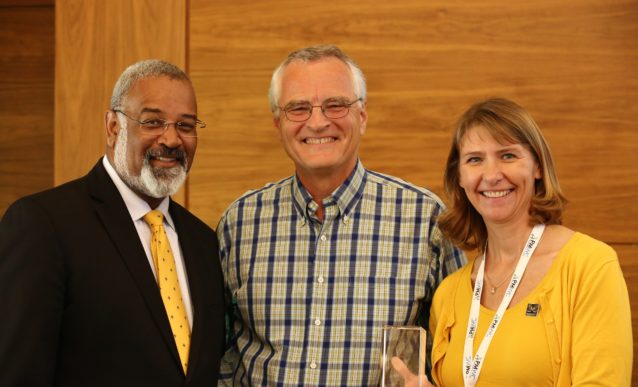
Pictured above (l to r): Martin Philbert, PhD, FRSC, Provost and Executive Vice President for Academic Affairs; Michael Boehnke, PhD; Vicki Ellingrod, PharmD.
All Photos courtesy of PMWC Intl.
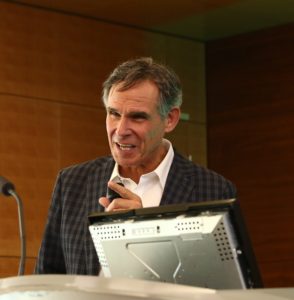
Eric Topol, MD
If the Midwest debut of the Precision Medicine World Conference (PMWC) hadn’t taken place on the University of Michigan campus, keynote speaker and honoree Eric Topol, MD, might not have shown up. “The reason I came is because it was at U of M,” said Topol, who had previously declined invitations to speak at PMWC on the West Coast. A former Michigan Medicine faculty member and Founder and Director of Scripps Research Institute, Topol received the PMWC Luminary Award for his work in cardiovascular genetics and genomics.
U-M President Mark Schlissel, MD, PhD, opened the two-day event, held June 6 and 7 at the Ross School of Business. The first physician-scientist to lead the university and the force behind U-M’s Precision Health initiative, President Schlissel emphasized the “life-saving potential” of big data. “Helping researchers do great science is one of the reasons I was excited to launch Precision Health at U of M,” said President Schlissel, adding that another impetus for Precision Health was to realize the potential of U-M’s many resources.
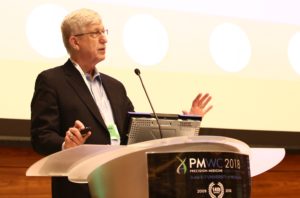
Francis Collins, MD, PhD
Following President Schlissel to deliver the opening keynote was another past faculty member of Michigan Medicine: Francis Collins, MD, PhD, the current Director of the National Institutes of Health (NIH). Speaking about NIH’s ambitious All of Us Research Program, a precision medicine initiative that he described as the “largest-ever undertaken longitudinal cohort study,” Collins gave “a big shout-out” to U-M and U-M Precision Health’s Michigan Genomics Initiative (MGI) as a model for All of US, providing “lessons that we could build upon.” He also acknowledged the input of U-M Precision Health Co-directors Sachin Kheterpal, MD, MBA, and Goncalo Abecasis, MD, PhD, as well as Michael Boehnke, PhD, from the School of Public Health.
Abecasis and Kheterpal were two of a number of U-M Precision Health faculty members who presented at the event, which was co-organized by College of Pharmacy associate dean and Precision Health workgroup leader Vicki Ellingrod, PharmD. Other Precision Health–affiliated presenters included Chad Brummett, MD, Brian Denton, PhD, and Jenna Wiens, PhD.
Faculty from a variety of U-M schools—such as Public Health, Medicine, Engineering, Pharmacy, and Law—spoke at the event, covering topics ranging from precision opioid prescribing, identifying genes for Type 2 diabetes, and applying machine learning to predict the spread of infection in hospitals, to how insurers interpret the regulatory aspects and legal definitions of next-generation sequencing.
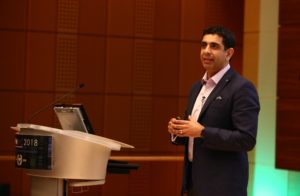
Sachin Kheterpal, MD, MBA
Several U-M alumni-turned-entrepreneurs also presented, alongside representatives from pharmaceutical and medical device industries, patient groups, and other universities.
PMWC showcased the depth and breadth of U-M’s involvement in precision health research. The number of presenters and award recipients with U-M affiliations demonstrated that the university’s Precision Health program, although launched recently, is built on a solid foundation of collaboration and a long history of research in the field.
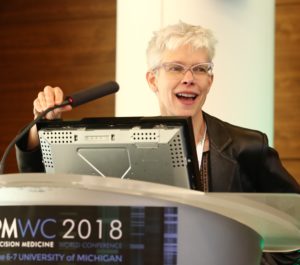
Susan A. Murphy, PhD
In addition to Topol, Susan A. Murphy, PhD, and Boehnke were honored with awards at the conference’s closing ceremony. Murphy, who spent 1998-2017 at Michigan as a researcher and professor in biostatistics and psychiatry, received the Luminary Award for her work in data science and mobile health care. Boehnke, Professor of Biostatistics and Director of the university’s Center for Statistical Genetics as well as its Genome Science Training Program, was given the PMWC Pioneer Award for his large-scale studies on genetic risk in diabetes and bipolar disorder.


